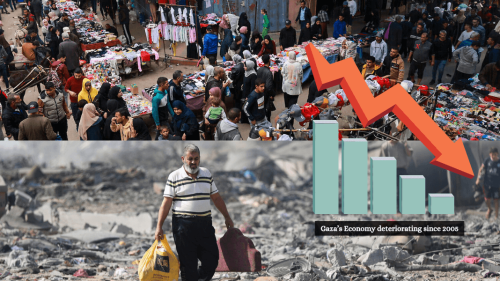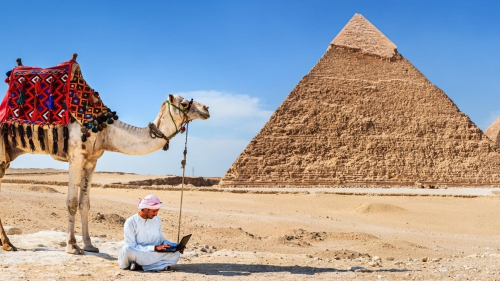The Deteriorating Palestinian Economy: Harsh Realities and an Unpredictable Future
By Ramzy Baroud
A state of "realism" has encircled the Middle East preceding and following the signing of Oslo, especially among the Palestinian leadership.
Waves of change in political approach and attitude have become noticeable. Many terms were dropped, sometimes entirely, and other times replaced by their counterpart. This modified approach quickly found its way to the Palestinian streets. Some have argued that violence got them nowhere, and maybe the proposed peace would be able to provide them with dignified and financially secured lives. Others even stretched the dream further, describing Gaza to be the future Monte Carlo, Singapore or Hong Kong the Middle East.
But almost 10 years after the launching of the Madrid talks, and seven years after the signing of the Oslo Accord, the Palestinian economy is at its worst. A recent study prepared by the " General Administration of Economic Affairs of the Arab League" confirmed that the unemployment rate among Palestinians has reached 60% in the last few years. The study has also uncovered disturbing information regarding the growing dependency on Israeli economy. The dependency rate, according to the study has reached an astonishing 85%-90% in recent years.
The Palestinian National Authority's Ministry of Information has published its own report, which described the Israeli domination over Palestinian economy as a process of "suffocation" so that a complete dependency on Israel's economy will be established thereafter.
It is evident that the crumbling Palestinian economy has fallen victim to harsh political realities that have victimized many other Palestinian sectors in the process. Israel's control over Palestinian borders has left Palestinian imports and exports, and therefore local Palestinian economy at mercy of the Israeli government.
While Israel has cleverly manipulated Palestinian's pressuring need to export their goods and agricultural products to the outside world, it has also closely monitored their imports.
Even in times of relative calm, when Israel chooses to open up Palestinian borders, Israel prevents Palestinians from importing certain goods that could propose a challenge for Israeli products.
By dramatically increasing the import tax or plainly disallowing the import of specific products, Palestinians on many occasions have had no choice but to resort to Israeli products, for they were the only accessible option. Consequentially, according to the PNA report, the Occupied Territories were the second importer of Israeli products following the United States.
Another result of Israel's charge over Palestinian borders was the failure of Palestinian manufacturers to offer alternatives for both the imported foreign goods and Israeli products. High tax and tariffs, and the prohibition to import needed raw materials, have made locally manufactured Palestinian products considerably costly and not easy to afford.
The foundation for a prosperous Palestinian economy was expected to be based on foreign economic aid. However, only 45% of the $3 billion aid money pledged to build the Palestinian economy between 1993 and 1998 has been delivered to the PNA. On the other hand, none of the $3.4 billion promised by international donors following the Wye River agreement has been delivered.
Other problems such as water shortages have also had undeniable effects on Palestinian agricultural, therefore on Palestinian economy. Water shortages in Palestine, like in surrounding Middle Eastern countries were largely effected by dramatic changes of weather and unprecedented dry seasons. Yet, the unfair distribution of water between Palestinians and Israeli settlements has created another predicament for Palestinian farmers.
According to Mr. Muhammad Al-Nashashibi, the Palestinian Finance Minister, Israel uses over 80% of The West Bank's water supplies, leaving millions of Palestinians with barely 20% of their own water. While 4000 Jewish settlers in The Gaza Strip enjoy their man-made fishing lakes and swimming pools, over a million Gazans are denied drinking water several days each month.
These economic difficulties are a direct result of unfair political settlements that favor some, while excluding others.
In order for any progress to ever take place in local Palestinian economy, major political adjustments must be considered. Political sovereignty and complete control of the borders are a pre-set condition for reviving the sinking Palestinian economy.
Once political independence is fully achieved, the skilled Palestinian laborers and experts, in addition to the will of the Palestinian people should enough to establish a considerably strong and reliable Palestinian economy.

















